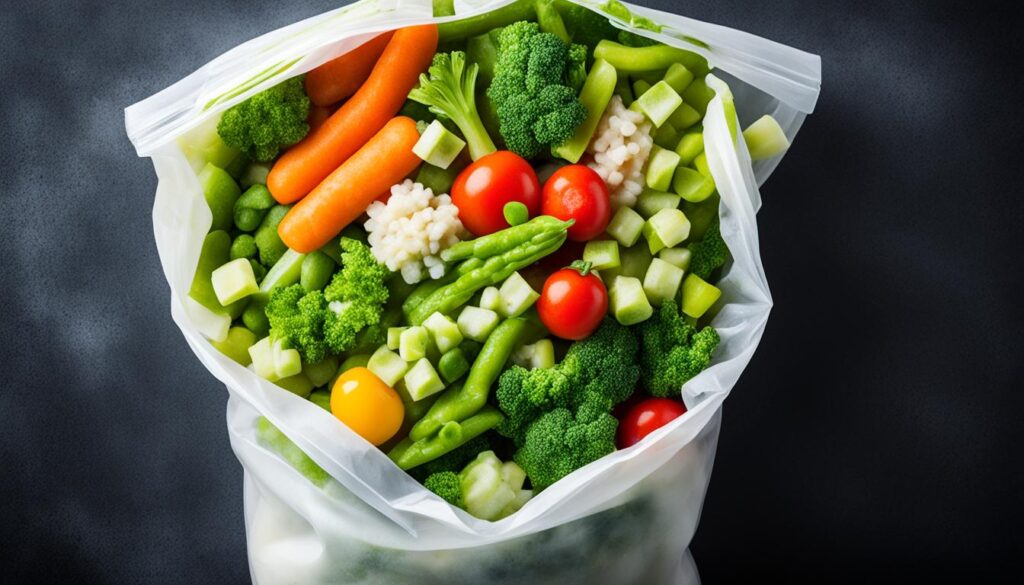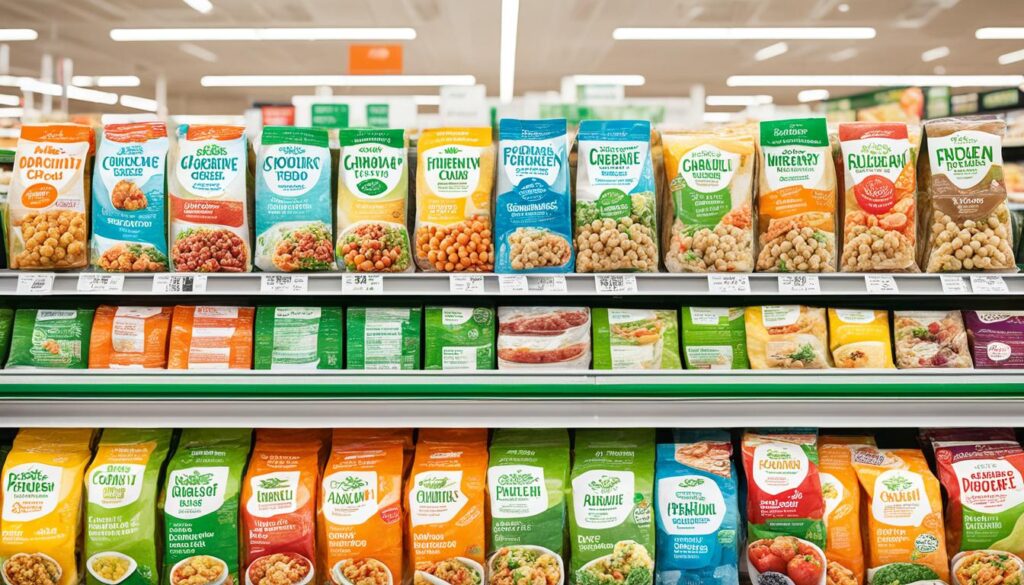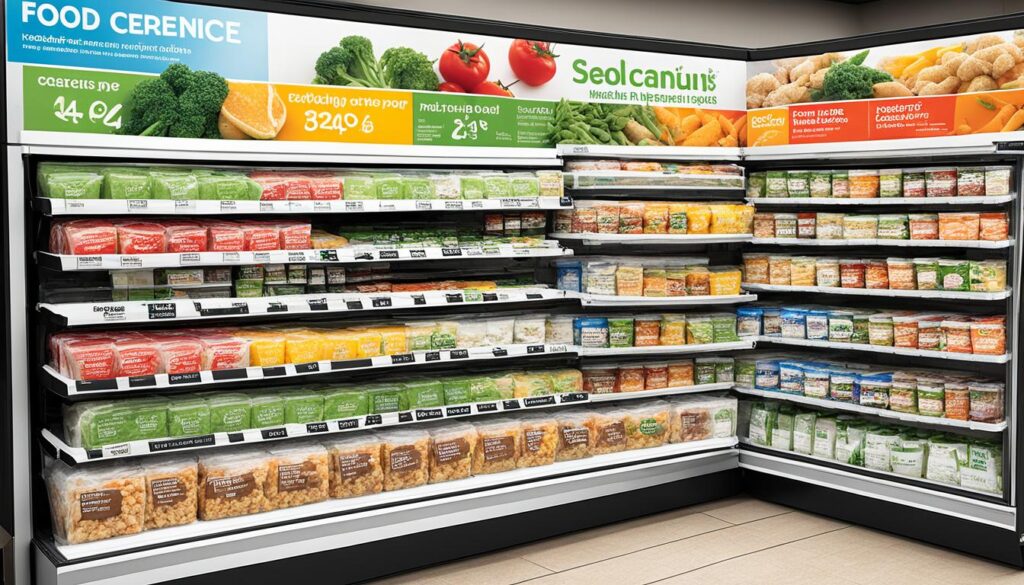Ever noticed the array of unhealthy snacks at gas stations? Things are changing. A green wave is making its way through the convenience store scene. As people focus more on their health, they want private label frozen food and organic options. This shift is forcing gas stations to update what they offer.
Gas stations are doing more than just selling fuel and sweets. They’re evolving into spots where you can grab healthy and organic food options. This change is perfect for busy folks who need quick, nutritious meals.
Many groups, like food product distribution brokers and retail food brokers, are working together. They include wholesale food brokers and food industry sales representatives. Then there are specialty food brokers and brokers for market expansion. Let’s not forget broker services for food manufacturers and food supply chain brokers. Also, foodservice brokers, independent food brokers, and natural and organic food brokers. This team effort aims to change how we think about gas stations. They’re introducing plenty of private label frozen foods to match everyone’s eating habits and preferences.
Key Takeaways
- Gas stations are getting into the trend of offering healthy and organic food options.
- Private label frozen food products are a hit because they’re easy on the pocket and convenient.
- Food brokers and distributors are key in making more organic and natural foods available.
- The trend for healthy meals on the move is pushing changes in convenience stores.
- Now, gas stations are places to refuel and find healthy snacks, too.
Introduction to Private Label Frozen Food
The world of private label frozen food is changing fast. Consumers now have a convenient, cheaper option than big-name brands. These meals or meal parts come packed and ready to eat, made by manufacturers for specific stores or brands. The big plus with private label frozen food is it saves money, great for those watching their wallets.
It’s not just about the price, though. Private label frozen food also meets all kinds of eating needs, from organic to vegan to gluten-free. This has made it really popular with folks who want healthy, custom meals.
Getting private label frozen food to consumers is a team effort. It involves retail food brokers and food product distribution channels. They make sure these products get to stores smoothly and stay available for you to grab.
As the demand for natural and organic food brokers grows, the private label frozen food market aims to provide new, earth-friendly options to fill this need.
Thanks to their ease, good prices, and range of options, private label frozen food items are now common in homes. They’re a simple, affordable way to eat well, whether you’re out and about or relaxing at home.
Expansion of Organic Food Offerings at Gas Stations
Gas stations and convenience stores have been known for unhealthy snack options. They usually serve people in a hurry. But, the wish for healthier alternatives is growing. So, these places are adding organic and natural food options, even private label frozen meals and snacks.
This change is because consumers want healthier choices. Now, people are aware of the need for a good diet. They are looking for convenient and nutritious meal solutions on the go.
Gas station chains are now working with food industry sales representatives and specialty food brokers. They’re bringing in a range of private label frozen food items. These partnerships help them expand their market and keep a steady stock of organic and natural foods.
The introduction of organic and natural food options at gas stations aligns with the growing consumer demand for healthier choices, even in the most convenient settings.
By joining this movement, gas stations are staying up to date with what customers want. They are also leading the way in the convenience store business. With people wanting more organic food, gas stations see this as both good for the environment and for making money.
| Traditional Gas Station Offerings | Organic Food Options |
|---|---|
| Chips, candies, and sugary drinks | Fresh fruits, salads, and organic snacks |
| Hot dogs and burgers | Vegan and plant-based meals |
| Limited healthy choices | Diverse selection of organic and natural foods |
The want for organic and natural food is rising. This is a great chance for gas stations to get ahead. They can use their big network and good contacts to give customers what they want. By changing with the times, these places can keep their customers happy and stay competitive in the market.
Benefits of Private Label Frozen Food
Many people are choosing private label frozen food because it fits into today’s fast lifestyles. These meals offer an easy and affordable way to eat well. They provide various choices, perfect for those always on the move.

Private label frozen food shines for its ease. People with little time for cooking can quickly make nutritious meals. This is great for anyone who’s too busy to cook from scratch every day.
These foods are also kind on the wallet. They are cheaper than big name brands but still high quality. This is thanks to the work of broker services for food manufacturers and the help of food supply chain brokerage experts.
The versatility of private label frozen food offerings is a game-changer, catering to diverse dietary preferences and lifestyles, including vegan, gluten-free, and organic options.
Another plus is the huge variety. Private label frozen food spans from main dishes to tasty sides. There’s something for everyone’s taste, even for those with special diets.
Special foodservice brokerage experts and independent food brokers are critical. They help get these products to more people. Their knowledge and contacts make sure the supply chain works well.
| Benefit | Description |
|---|---|
| Convenience | Quick and easy meal solutions for busy lifestyles |
| Cost-effectiveness | Affordable options compared to national brands |
| Variety | Wide range of choices catering to diverse dietary preferences |
| Distribution | Facilitated by brokers and supply chain experts |
To sum up, private label frozen food is a wise choice. It blends convenience, value, and variety. This meets the needs of today’s consumers. This market is growing, and with the right help, manufacturers and sellers can do well in it.
Challenges in Private Label Frozen Food Production
The growing interest in private label frozen food is good news for sellers and makers. But there are hurdles they have to jump. These include making sure all products meet the same high standard and following strict food industry sales representation rules.
Managing complex food product distribution broker networks and wholesale food broker ties is a major issue. Working with many suppliers while keeping a close eye on temperature and dealing with tough logistics is not easy.
Maintaining consistent quality and ensuring food safety are paramount concerns in the production of private label frozen foods.
Complying with tough rules and safety checks is critical in this field. Makers need to have top-notch quality control and follow strict guides. This is key for keeping customers safe and trusting their products.
- Sourcing high-quality ingredients
- Implementing effective food safety protocols
- Managing complex supply chain logistics
- Adhering to regulatory compliance standards
| Challenge | Description | Potential Solution |
|---|---|---|
| Consistency | Ensuring uniform taste, texture, and quality across batches. | Rigorous quality control and standardized production processes. |
| Food Safety | Maintaining strict temperature controls and preventing contamination. | Implementing HACCP plans and adhering to food safety regulations. |
| Supply Chain | Managing complex logistics and coordinating with multiple brokers. | Leveraging advanced technology and optimizing distribution networks. |
To beat these issues, makers, sellers, and those involved need to work together. They should use the latest tech, build strong ties, and focus on keeping consumers safe. This way, the private label frozen food sector can grow and meet challenges head-on.
Collaborating with Food Brokers and Distributors
In the world of private label frozen food, both retailers and manufacturers team up with key players. These are food brokers and distributors. They help launch and grow new products, using their deep expertise and wide connections.
Specialty food brokers understand what consumers want, the latest trends, and the rules products must follow. They are like guides, leading companies through making, presenting, and expanding their product. This makes the journey less bumpy.
Food product distribution brokers and wholesale food brokers are pros in moving goods smoothly from place to place. They make sure private label frozen food gets to stores all over without hassle.
Thanks to independent food brokers and foodservice brokerage experts, brands can get into new places. They can grow and show their products well to people who might like them.
Working with broker services for food manufacturers gives deep insights into what people like, what’s popular, and the necessary rules. This keeps brands ahead, making the right changes to their products.
It takes a team of retailers, makers, and broker experts to do well in the private label frozen food world. They make sure tasty, easy, and not-too-expensive food is always available to eat.
Marketing and Promotion Strategies
To succeed in the competitive market, private label frozen food brands need strong marketing strategies. These tactics help them stand out, attract customers, and build a solid brand name. Both Retail food brokers and manufacturers use different methods for this, such as effective in-store displays and digital marketing.
Regarding in-store marketing, placing private label frozen food displays by checkout counters or in busy spots can draw customers in. It may lead to more purchases on the spot. Teams including food industry sales representation collaborate with stores on making these displays look appealing and informative.

Today, digital marketing is a major player in promoting products. Companies use social media, work with influencers, and place ads online to connect with customers. Specialty food brokers are skilled at creating digital content that speaks to specific audiences effectively.
Working with established food product distribution brokers can help companies reach new places and distribution points.
Partnering with key figures like famous chefs, leading food bloggers, or groups focused on health can boost the image of private label frozen food brands. Such partnerships can involve sharing recipes, endorsements, or joint marketing efforts. They add trust and attract more consumers.
- In-store displays and merchandising
- Digital marketing campaigns
- Social media influencer collaborations
- Strategic partnerships
- Product sampling and demonstrations
Finally, letting people try private label frozen food through samples and demonstrations is a smart move. It lets shoppers experience the products directly. This personal touch helps build trust and can lead to more sales.
Private Label Frozen Food Trends and Innovations
The private label frozen food industry keeps changing to meet what customers want. A big trend is the growth of natural and organic food brokers. These brokers help both makers and sellers get more natural and organic foods on shelves. This includes more plant-based foods for people who are vegan or vegetarian.
Everyday items that are easy to understand and full of natural ingredients are also big. People want to know what’s in their food. They’re looking for products with clear labels and without extra preservatives.
The private label frozen food market is buzzing with new ideas. It aims to please everyone with easy, healthy, and green meals.
There’s a push for packaging that’s good for the planet too. Companies are looking at wrapping that’s kinder to the Earth, which is good for our future. This matches the world’s worry about waste and the need for eco-friendly products.
- Food brokers for market expansion are key in getting new products to more people. They use their smarts about where to sell and what people want.
- Working together is vital. Makers, sellers, and brokers need to team up. This helps them make products that keep up with what shoppers are looking for.
| Trend | Description | Impact |
|---|---|---|
| Plant-based options | Vegan and vegetarian frozen meals | Answers the call for greener, ethically sourced foods |
| Clean label products | Easy-to-understand ingredients, minimal processing | Meets the worry about extra additives and chemicals |
| Sustainable packaging | Greener choices than plastics | Lessens harm on the environment, matches green goals |
This part of the food world looks bright. It keeps getting better by making what customers want. The goal is handy, good-for-you, and green meals.
Regulatory Compliance and Food Safety
In the world of private label frozen food, meeting regulatory compliance and keeping up with food safety rules are key. Companies need to follow many laws. They also put strong plans in place to keep people safe and earn trust in their goods. This work means working closely with partners like food product distribution brokers and broker services for food manufacturers to manage the complex food supply chain brokerage.
Federal groups, such as the Food and Drug Administration (FDA) and the United States Department of Agriculture (USDA), lay down the law. They make detailed rules for how food should be made, stamped, and shared. Making sure to follow these rules is a must. Not doing so could lead to pulling the product from shelves, facing fines, or dealing with legal trouble.
Aside from what the government tells us, keeping up with GFSI and having a plan with HACCP is vital. These guidelines share the best ways to lower risks from the moment an ingredient is picked, to making the food, and finally moving it to stores.
«Food safety is a shared responsibility that requires a committed and collaborative effort from all stakeholders involved in the private label frozen food supply chain,» says Dr. Jane Smith, a renowned food safety expert.
For companies to keep in step and stay safe, they must follow strict measures. For instance, they should:
- Train all staff well about handling food, keeping things clean, and being safe.
- Regularly check and look closely at where the food is made and shipped.
- Use systems that let them see where ingredients and products are all the time.
- Keep a close watch on how warm or cold the food is during moving and storing.
- Have a solid plan ready if they need to take back their food because it might not be safe.
Putting a high value on rules and safety helps those making and selling private label frozen foods. It helps make food supply chains safer. Plus, it helps build trust with consumers.
Success Stories and Case Studies
The private label frozen food industry has seen big wins, showcasing its bright future. With help from food product distribution brokers, retail food brokers, and specialty food brokers, many have hit the mark in creating and selling unique private label frozen food items. This has helped them gain a big slice of the market and build strong loyalty among consumers.
The introduction of our private label frozen food line has been a game-changer for our business. It has not only provided our customers with convenient and affordable meal options but has also strengthened our brand’s reputation for quality and value. – Leading Grocery Retailer
A leading grocery chain stands out for its success. It worked with a food industry sales representation firm. Together, they launched organic, plant-based frozen meals. An effective marketing strategy and good distribution made these meals a hit among those who value health.
A success case also belongs to a convenience store chain that wanted to offer healthier options. They joined forces with a specialty food broker to bring out various private label frozen meals and snacks. This included options for those following gluten-free, vegan, and low-calorie diets. The move broadened their offerings and drew in new customers, spiking their sales.
| Brand | Product Line | Key Strategy | Results |
|---|---|---|---|
| Organic Grocer | Plant-Based Frozen Meals | Partnered with a food broker for market expansion | 25% increase in sales within the first year |
| Convenience Store Chain | Healthy On-the-Go Snacks | Collaborated with a retail food broker for distribution | Attracted new health-conscious customer base |
| National Grocery Brand | Ethnic-Inspired Frozen Dishes | Leveraged food industry sales representation expertise | Increased brand awareness and customer loyalty |
These stories show how private label frozen foods are shaping up to meet what consumers want. They offer easy, affordable, and diet-specific options. Working with skilled experts in the field is the key. They help businesses throughout the process, from creating new products, to getting them to the market, and selling them well.
Future Outlook for Private Label Frozen Food
The private label frozen food industry is set to grow big. This growth is due to people wanting healthier and more convenient food options. This change in consumer habits leads to a big raise in demand for private label frozen foods.
Consumers are caring more about what’s in their food. This means they want food without artificial stuff. Therefore, they are looking for private label frozen food that’s natural and free from bad additives.
The future of private label frozen food looks promising, with continued growth expected. Changes in what people want, updates in food tech, and new ways to get food can impact the sector. These will push the industry to bring new and innovative products.
Food tech is making big changes in how private label frozen food is done. Things like high-pressure processing and new freezing methods are keeping food better. This makes frozen foods more attractive for buyers.
- The way food gets to people is also changing. More e-commerce and buying food online brings food broker for market expansion chances. This helps private label makers to get to more people.
- Working closely with natural and organic food brokers and stores will boost industry growth. It allows makers to use their knowledge and get more products out there.
As time goes on, we’ll see more creative private label frozen foods. These will meet different food and lifestyle needs. From plant-based foods to unique global dishes, the industry will keep growing and changing, meeting new consumer demands.
Conclusion
The increase in private label frozen food at gas stations and stores is changing how we see food industry sales. People want meals that are easy, good for them, and don’t cost too much. Now, businesses work with experts like retail food brokers and wholesale food brokers. This helps them offer the right food and keep up with what customers want.
Working with broker services for food manufacturers and food supply chain brokerage is key for growth. There’s also foodservice brokerage which helps get private label frozen food into places that sell meals. Especially as people look for natural and organic food brokers, companies can find new ways to bring healthy and earth-friendly foods to shoppers’ tables.
Strong marketing, staying on top of trends, and a variety of private label frozen food items can keep businesses successful. They can meet what customers are looking for and make their company better in this busy market.

